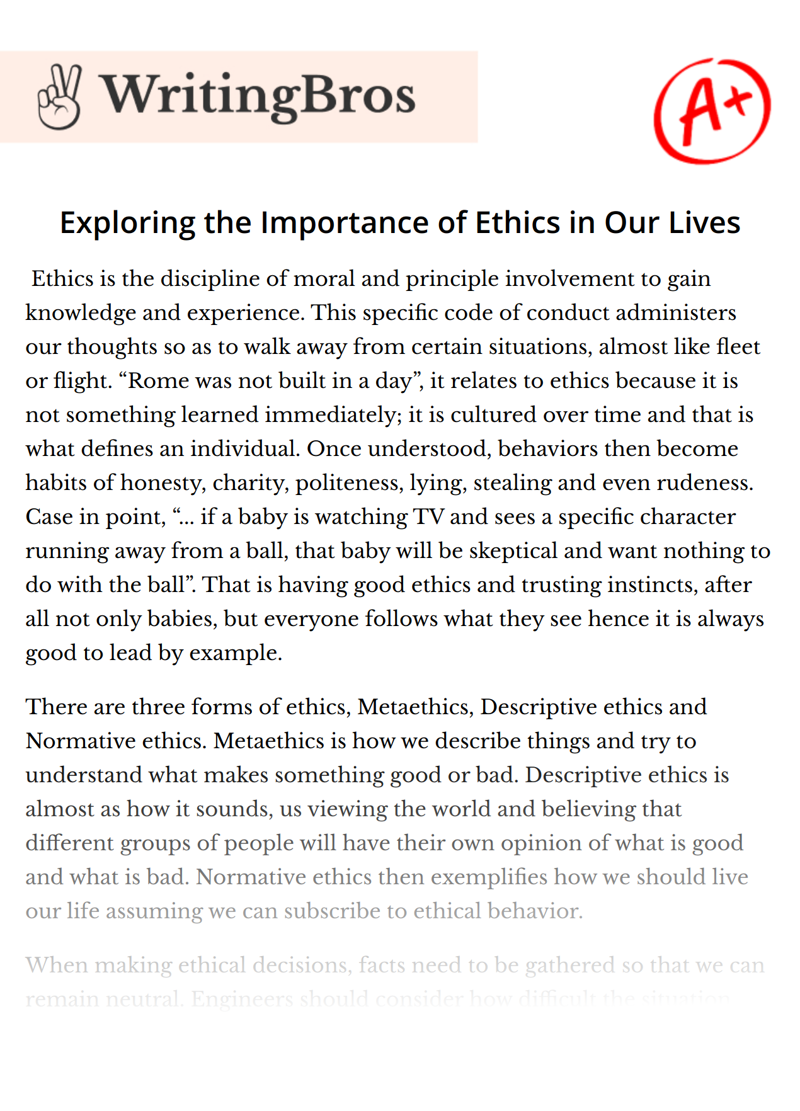Exploring the Importance of Ethics in Our Lives

Ethics is the discipline of moral and principle involvement to gain knowledge and experience. This specific code of conduct administers our thoughts so as to walk away from certain situations, almost like fleet or flight. “Rome was not built in a day”, it relates to ethics because it is not something learned immediately; it is cultured over time and that is what defines an individual. Once understood, behaviors then become habits of honesty, charity, politeness, lying, stealing and even rudeness. Case in point, “... if a baby is watching TV and sees a specific character running away from a ball, that baby will be skeptical and want nothing to do with the ball”. That is having good ethics and trusting instincts, after all not only babies, but everyone follows what they see hence it is always good to lead by example.
There are three forms of ethics, Metaethics, Descriptive ethics and Normative ethics. Metaethics is how we describe things and try to understand what makes something good or bad. Descriptive ethics is almost as how it sounds, us viewing the world and believing that different groups of people will have their own opinion of what is good and what is bad. Normative ethics then exemplifies how we should live our life assuming we can subscribe to ethical behavior.
When making ethical decisions, facts need to be gathered so that we can remain neutral. Engineers should consider how difficult the situation may be, the interpretation an audience may have and making a prediction about the future after the decision is made. Feelings also play a role in ethical decisions or commonly known as that “gut feeling”, wondering if you will regret your decision in the long run. Most importantly, when making a decision you should be secure with your decision to discuss the matter regarding what judgement led to the verdict.
In the video section of “What is this thing called “Ethics””, it is made to recognize that as engineers, they can make poor ethical decisions just like others in a different field. For example: working for the Federal Aviation Administration (FAA); after leaving the company as an employee, they cannot interact with an airplane company after 2 years due to the sensitive information they still know and can use it to their advantage or even putting others in danger.
Engineers work in industry, education and sometimes government institutions where they must follow a code of ethics created by Professional Societies. Some societies include the National Society of Professions Engineers, American Society of Civil Engineers and the Institute of Electrical and Electronics Engineers. According to the code, being ethic is not a matter of following feelings because it can stray from what is meant to be ethical. An individual following his or her feelings may withdraw from doing what is right, almost like being in an argument and having a reaction to be regretted after. After the damage has been done it cannot be taken back.
Having standards to follow are not always fixed, there are rights, benefits, values, fairness and obligations. It is a decision-making process to choose between two or more outcomes since nothing in life is ever simple. As mentioned in one of the videos, you can have a company with 5 employees and no pollution, 10,000 people – little pollution, or 50,000 people and heavy pollution. Knowing how to make the right decision for the company will be impactful since virtues are meant to be exercised.
In connection with the Biblical worldview, the Bible is implicit to be a book full of standards imperative to follow to reveal truth and guidance amongst each other. Religion can set high standards providing motivation, but “... ethics cannot be confined to religion nor is it the same as religion.” If the value of an individual can change, their ethics also can be changed, standing by what we are aware of to live by the ‘truth’.
Cite this Essay
To export a reference to this article please select a referencing style below

